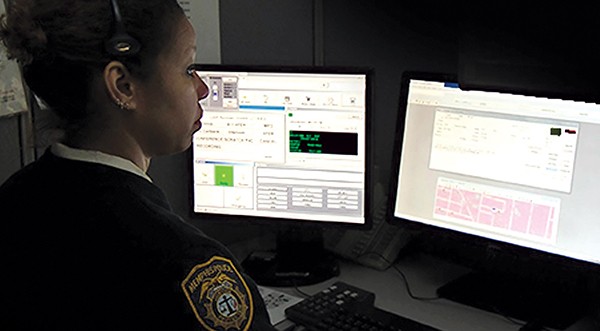The number 911 is shorthand for a situation that can’t wait, but if you called that number in Memphis a year ago, that’s just what you did.
Last year, some 911 callers here would wait for up to 100 seconds — more than a minute and a half — before talking with a dispatcher. Since then, that wait time has been cut to 20 seconds for nearly all calls, according to Mike Spencer, the emergency communications administrator for the Memphis Police Department (MPD).
And wait times continue to shrink. For the 50,000 calls made in October, the average wait time was 8.5 seconds, while 93 percent of calls were answered within 20 seconds.
Spencer said that answering calls quicker is solving another problem: abandoned calls. This happens when callers dial 911 and hang up after waiting for a while. Operators then have to call those callers back, which leads to a “cycle of trying to get caught up.”
He said that quicker responses are partly due to the recent influx of hires at dispatch centers, as well as data-driven approaches now used to staff centers appropriately based on the time of day.

Wait times are way down.
Still, the city’s administration isn’t content. Two years ago it set a goal of answering 95 percent of all calls within 20 seconds. Reaching that goal would get the city in line with the National Emergency Number Association’s recommendation and the national standard.
“This is a success story, but we are not satisfied until we reach the national standard of 95 percent … and 95 is not the ceiling, it’s the floor,” said Doug McGowen, the city’s chief operating officer.
Memphis City Council member Worth Morgan, who is leading the council’s charge to reduce 911 answer times, said the progress made in the last two years is “remarkable and necessary.”
“We’re almost there at 95 percent and hoping for a good Christmas,” he said.
The council also hopes to raise emergency response efficiency by cracking down on false alarms. Council members approved a new rule that will require businesses with multiple false alarm incidents to verify there’s an emergency before police are dispatched to the scene.
This applies to commercial businesses that have been cited for six or more false alarms since July 1, 2017. Currently, that includes 34 businesses, each having 15 or more false alarms since that time.
Those repeat-false-alarm offenders now must confirm unauthorized entrance to their business either through an in-person or digital inspection before police respond to an alarm activated there.
McGowen said the goal is “not necessarily to punish anyone,” but rather to reduce the number of false alarm incidents in the city that “take away from critical public safety assets that we have too few of in the first place.”
Responding to the 34 businesses’ false alarms, he said, took 7.5 hours of police time. Responding to all false alarms in Memphis costs the city more than $1.6 million annually.